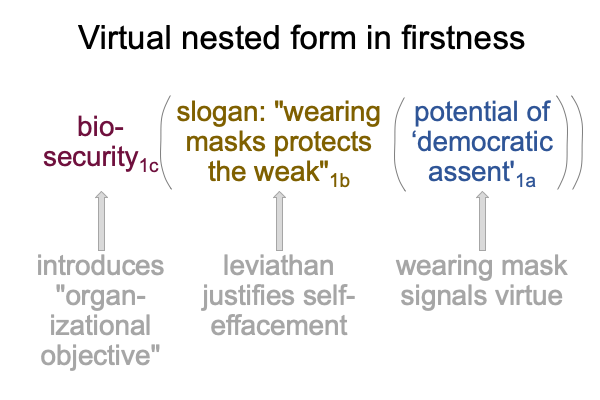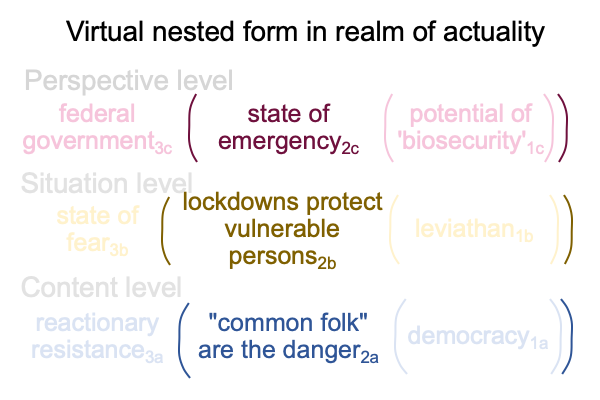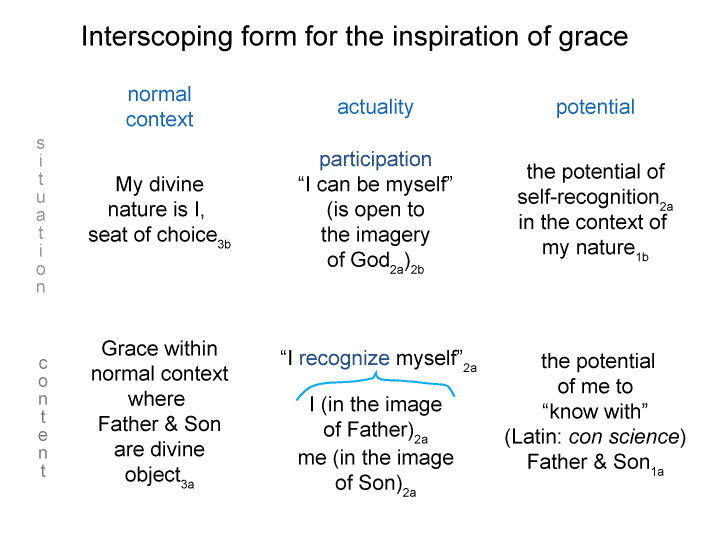Looking at Matthew Crawford’s Essay (2022) “Covid Was Liberalism’s Endgame” (Part 7 of 10)
0035 A mystery resolves into a heresy. An intersection unravels into a two-level interscope. One nested form goes into the content level. The other nested form enters the situation level. Two configurations are possible. Typically, one predominates.
What is a heresy?
You tell me. The answer appears before you.
0036 In the heresy of technocratic progressivism3, leviathan1b virtually situates democracy1a.
What is leviathan1b?
Leviathan1b is the potential of a state that will protect us (from one another)1b. Another way to describe this term is the potential of feelings of security1b, in a world filled with sociopaths2a.

0037 The implication is that human nature3a coheres with purely calculated judgments2cA, dispassionate perceptions2bAand stoically accepted sensations and decodings2aA.
Such dedication to reason means that humans are basically sociopaths, unable to register the emotional reactions of others. There is no way that these sociopaths can govern themselves. Therefore, democracy1a, the potential of self-governance1a or the potential of a state arising from people being reasonable or sensible1a, must be virtually situated by a leviathan1b, underlying a state of nature3b.

Human nature3a is sociopathic3a.
The state of nature3b is a state of fear3b.
0038 Yes, the state of fear3b, which describes what the leviathan1b apparently aims to prevent, becomes the normal context favored by technocratic progressivism3, as it3 brings the actuality of the unraveled individual2 into relation with the potential of ‘remaking humans’1.
0039 Surely, this does not makes sense. Yet, it is precisely what Crawford witnesses during the lockdowns.
Human nature2a is ruthlessly3b suppressed by sovereign acts and decrees from a department of the leviathan1b aiming to protect vulnerable people2b, on the basis of a threat to health from the state of nature3b. Lockdowns and mask requirements violate commonsense2a, yet anyone questioning the sovereign acts and decrees is regarded as a sociopath1a, who does not care about the health of vulnerable people2b.
I suppose that Crawford’s witness implies that the state of nature3b is a state of fear3b that, contrary to rational calculation3a, arises from the potential of a state that aims to promote feelings of security1b and to provide both material and psychological safe harbor for vulnerable people2b.
Does that sound like lockdowns and stimulus checks?








